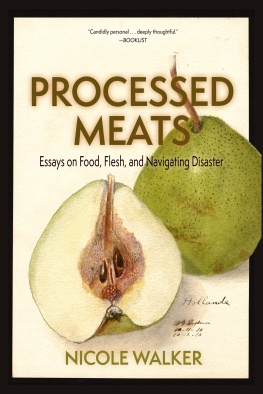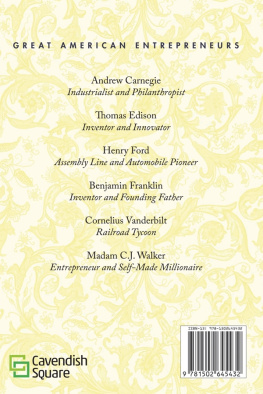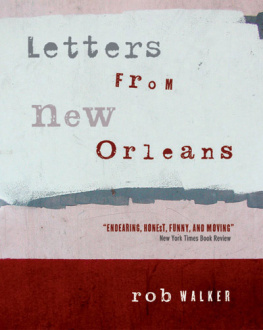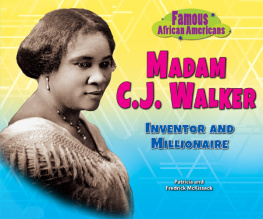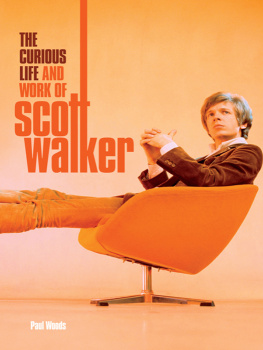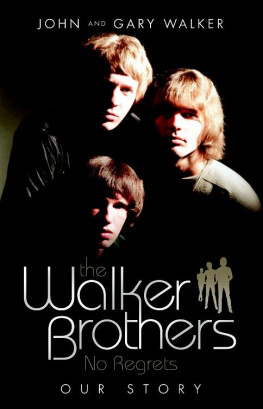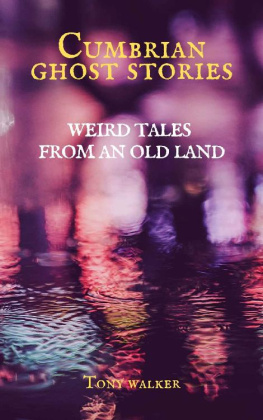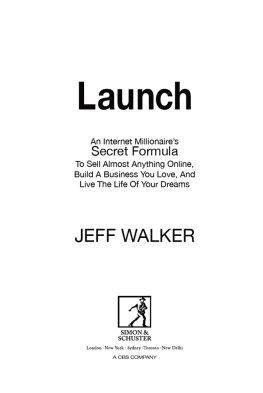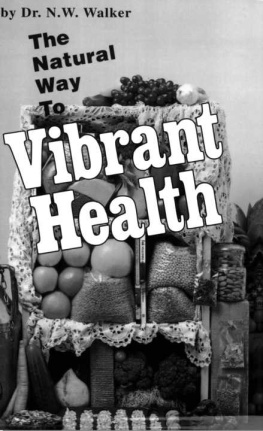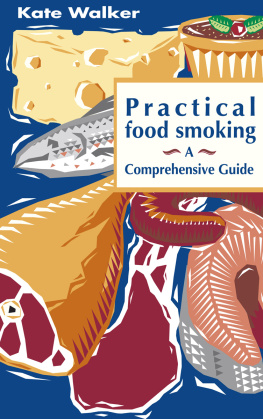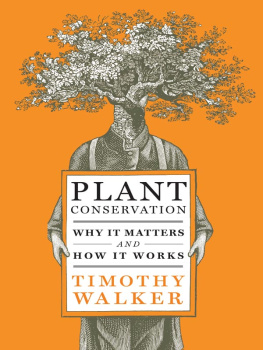
PRAISE FOR PROCESSED MEATS
Candidly personal Walker frames contrasting concepts of stability versus risk, abundance versus dearth, self-sufficiency versus reliance within the context of the larger global imperatives of climate change, pollution, and sustainability. The result is the kind of deeply thoughtful and relatable discussion one might have with ones best friends around a dinner table, back in the day when one could safely do that kind of thing.
BOOKLIST
This is some brilliant, snappy, poetic, serious, hilarious stuff.
CRAIG CHILDS, author of Virga and Bone
Walker plays her way linguistically deep into the grotesque and marvelous realities of what it means to live in a female body and to depend on other bodieschicken, raven, pig, veal, cougar, husband and childfor ones sustenance. I woke from this book as from a sweet and slightly dirty dream, sex and cooking swirling in my mind, saying yes and yes to the bizzare beauty of a fleshly existence.
ALISON HAWTHORNE DEMING, author of Zoologies: On Animals and the Human Spirit
Walker gathers seemingly disparate scraps of earthly experience and sniffs out their secret connections, before stitching them together into the sort of tapestry that is as colorful as it is interrogative, as disarming as it is bursting with light.
MATTHEW GAVIN FRANK, author of The Mad Feast and Preparing the Ghost
To think about food is to think about life, and Walker does so with brilliant complexity and insight.
BICH MINH NGUYEN, author of Stealing Buddhas Dinner
This book is more than funny, more than tough. Its about appetitefood as, life as, place as, memory as, hope asand about how, through the act of articulation itself, we can make a meal of lifes pain and peace.
CHRISTOPHER COKINOS, author of Bodies, of the Holocene
PROCESSED MEATS
PROCESSED MEATS
Essays on Food, Flesh, and Navigating Disaster
Nicole Walker
TORREY HOUSE PRESS

Salt Lake City Torrey

First Torrey House Press Edition, March 2021
Copyright 2021 by Nicole Walker
All rights reserved. No part of this book may be reproduced or retransmitted in any form or by any means without the written consent of the publisher.
Published by Torrey House Press
Salt Lake City, Utah
www.torreyhouse.org
International Standard Book Number: 978-1-948814-34-8
E-book ISBN: 978-1-948814-35-5
Library of Congress Control Number: 2019955068
Cover illustration by Deborah Griscom Passmore
Cover design by Kathleen Metcalf
Interior design by Rachel Leigh Buck-Cockayne
Distributed to the trade by Consortium Book Sales and Distribution
Torrey House Press offices in Salt Lake City sit on the homelands of Ute, Goshute, Shoshone, and Paiute nations. Offices in Torrey are in homelands of Paiute, Ute, and Navajo nations.
Acknowledgments
Tongue, Witness (Spring 2015)
Notable Essay, Best American Essays 2016
Out of Place, River Teeth (Spring 2014)
On Anger, Passages North (Spring 2014)
Notable Essay, Best American Essays 2015
The Unkindness of Ravens, Triquarterly Summer/Fall (2013)
Notable Essay, Best American Essays 2014
Antibodies in Fifth Wednesday (Fall 2013).
Veal Animal Magazine (August 1, 2013).
Move Out Precipitate: A Journal of the Environmental Imagination.
A Permanent Home. New Ohio Review (2009): 22-30.
Dissociation. Agni Online (Fall 2007).
Making It Palatable. Hotel Amerika 7.1 (2008): 6-10.
Amalgamated Products Are Us. Slice 1.3 (2008): 105-109.
CONTENTS
PREFACE
F IVE PINT-SIZED MASON JARS sit on the windowsill of my kitchen. Two with butts of romaine hearts. One with the butt of a celery. One with a garlic clove and another with the roots of a scallion swimming in ounces of water encouraging new roots to swirl in their depths. There was a time when the only butts I worried about were the butts of cigarettes I smoked. Now, I wonder how much lettuce can I grow to feed my family. Or at least make a reasonably sized salad.
It is day fifty-three of the COVID-19 lockdown. Ive planted peas. Their thin-as-spiderweb tendrils have begun to unfurl and reach for something even stronger than the sun to defy gravity. My son, Max, and I strung twine fifteen different ways up and around some old tomato cages because the truth is, trying to grow anything in Flagstaff, at a seven-thousand-foot elevation, is a bit of a crapshoot. Still, every day, we check the dirt in the garden bed Erik built. We open the wood frame gate to crawl up and over the edges of the box. Erik raised the beds two feet high and wrapped the upper levels with plastic fencing. The fencing is to keep out the deer. The two-foot-high box is meant, I guess, to accommodate six hundred square feet of perfect dirt. So far, weve filled it only halfway. Still. The dirt is perfect. Max sticks his finger an inch deep.
Is it still wet?
I just watered it this morning, Mom. Of course it is.
All babies are born teenagers these days but his smart-ass comment is truly unhelpful. The weather has become unpredictable. Sometimes, it is actually humid in this semi-arid desert climate now that the jet stream has shifted. Now that it rains more than it snows.
With the pandemic, everything has changed. What does one do with a book about fear of apocalypse and desperate cooking when the whole world is now contending with these issues without hyperbole? In Processed Meats, the narrator (me) is batted around by life challenges, but nothing compares to this news. How does one publish a narrative about disaster without recasting those challenges in light of a global pandemic? The past still exists, and still matters, but the perspective must change. Its going to take a lot of work to make this work not only artistic and meaningful, but culturally relevant.
My friend, the climate scientist Bruce Hungate, directs the Center for Ecosystem Science and Society. He serves the Department of Energy as part of the climate change task force. We usually meet once a month for Cobb salads to discuss his writing and my freaking out about climate change. He studies microorganisms in soil. I bug him about an essay I want to write about these pictures showing the Himalayas in Nepal and downtown LA. Is there really that much less pollution? Does a lack of visible particulates suggest fewer carbon emissions?
He answers that there are dangers in seeking silver linings. I am embarrassed to tell him that I live for silver linings. I prefer a slight bit of ignorance if I can, pea-tendril-like, fling my hopes on the warming edge of a little bit of cloud. I dont want to be a fool but I do want to believe that the tiny changes Ive made lately have been more than just a privileged time to grow some peas and to cook for my family six days a week instead of the usual five.
In a pandemic, cooking at home is its own kind of silver liningat least we can eat dinner together every night. At least Im challenged to make dinner interesting.
My family disagrees about which meal Ive cooked is the best. Erik says it was the wedge salad, filet mignon, and baked potato. Max says the spicy curry. Zo says the Cobb salad even though she eats it without the bacon or the blue cheese, making the Cobb salad really just a chicken and egg salad. With avocado and tomatoes, she corrects.
Next page
